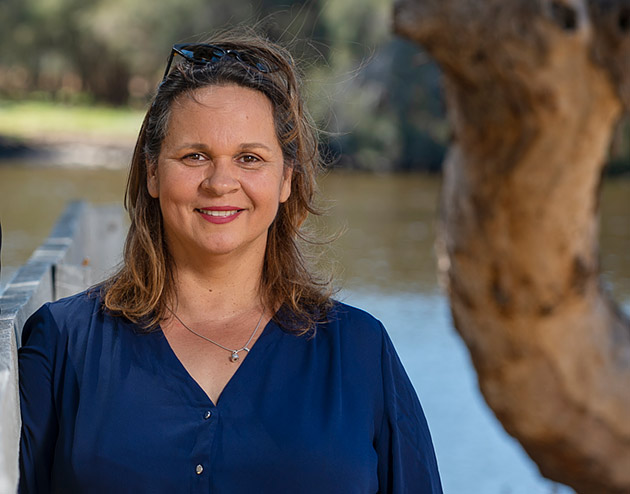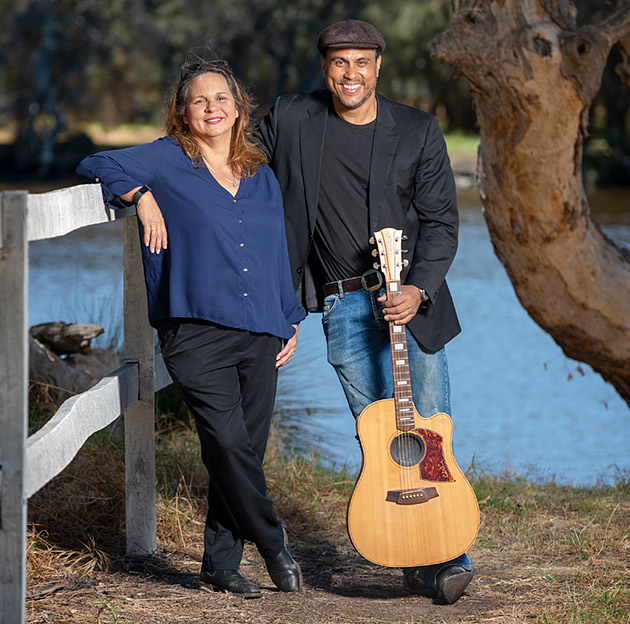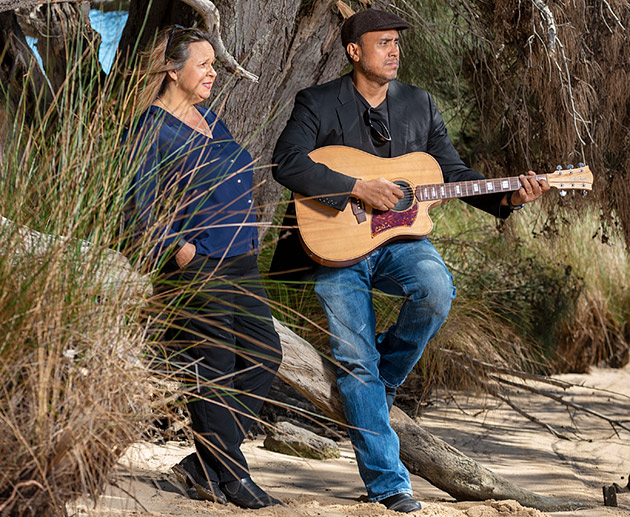20 February, 2019 By: Wendy Caccetta
Meet the woman whose songs are taking Noongar language to the world
Listening to Gina Williams’ sing it is difficult to believe she couldn’t speak Noongar until she was an adult, and yet now she's taking her language centre stage.
Williams, 49, and her music partner, guitarist Guy Ghouse, are in talks to tour Europe and the UK with the songs she performs in her traditional tongue, taking the words of our Wheatbelt to the world, a nice tie to the UN Year of Indigenous Languages.
It is a big turnaround for the Noongar language which, along with hundreds of other Aboriginal languages, had been largely silenced following European settlement. The 2016 Australian Bureau of Statistics census found there were just 387 Noongar speakers left in WA, or 0.5 percent of the State’s 72,930 Aboriginal people, which includes other groups aside from Noongar.
No breakdown is available for the dialect of the Balladong-Noongar people, one of the major Noongar clans.
So with plans to tour overseas, Williams wants to turn those numbers around. “I guess I want to push this as far as I can…,” she says. “Wouldn’t it be wonderful if we were all singing a language song of the land we were born in?”

Laying the foundations
Williams maternal grandmother was born into the Kitja people of the East Kimberley but removed at age four to the Mogumber Native Mission at Moore River more than 2000km away. There she met Williams’ grandfather, a Balladong man whose traditional lands are in the WA wheatbelt.
Their daughter, Williams’ mother, was born in Kellerberin and also became a member of the Stolen Generations.
Williams was adopted out at birth to Noongar parents. After her adopted parents passed away early when she was 12, she was placed in foster homes. However she says that in those early years, there was always music - if not Noongar language - in her adoptive home.
"When it was hot in summer and with no air conditioning back in the day, my parents would put a blanket on the front lawn and we had a record player that stacked records.
“Mum and Dad would choose different albums. Mum chose a lot of country and western and Dad chose the people he said really knew how to sing. So I met Billy (Holiday) and Ella (Fitzgerald), I wanted to be Sarah Vaughan when I grew up and to marry Nat King Cole.
“So I learnt to sing by listening,” Williams says.
Singing my language
At 40, Williams, by then a mother of two daughters with a successful media career behind her including hosting her own TV show with GWN in Bunbury, enrolled in a Noongar language course at TAFE.
About the same time, she started working with Ghouse, who is of Chinese and Indian descent, born in Australia and raised in the Kimberley. The pair have become musically inseparable.

Williams was already singing and songwriting in English, but learning language set her on a new path.
“I went to class and my teacher, Merinda Hansen walked in,” Williams says. “I was the only Noongar in the class.
“Internally I was going ‘this was a mistake’. Merinda spotted me and said ‘Why are you here?’ I said ‘I don’t know. I didn’t grow up with my language and I feel embarrassed and ashamed that I have to come to TAFE to do this’.
“Merinda said ‘That’s not your shame dear, that’s ours’.
“It was like something cracked open. I hadn’t considered there was something deeper. Merinda looked at me and said again ‘So why are you here?’ Without even thinking I said, ‘Because I want to write songs and I want to sing my language’.”
Williams wrote her first song in Balladong — Iggy’s Lullaby — while studying and pregnant with her third child, son Tom. She’s also done a Balladong version of Englishman in New York, Sting’s hit from 1987.
Williams took a pivotal trip to Kellerberin with Gouse after her returning from an arts program in the UK.

“We got to Kellerberin and my Uncle Tom Hayden, a beautiful elder and one of my favourite human beings on the planet, was waiting for us,” Williams says.
“I was like ‘Uncle Tom I have to write songs in language, but I don’t know what to write about’. “He said ‘That’s easy. There’s four things, your koort, your moort, your boodja and koorlangka. Heart, family, land and legacy. If you have those four things in place everything else works’. “It was like he dropped this pearl, this treasure, in my heart.”
Collaboration and reinterpretation
In 2015, Williams and Ghouse released a second album, Bindi Bindi, featuring nine original tracks and a cover and translation of The Church’s Under the Milky Way — Ngarda Djinda Kedalak. Steve Kilbey, who wrote the original song, invited Williams to sing her version at a Perth gig.
Enjoying this article?
Sign up to our monthly enews
“It was the most scary thing I’ve ever done,” she says. “We were out in the carpark and he goes ‘darling, you didn’t translate the second verse. Why not?’ “I was like ‘dude, curtains, Memphis, seriously cut me some slack on this’.
“He was like ‘No, no that’s not what I’m singing about. I’m singing about Elvis, the King is dead, he’s gone, he’s not coming back. “When he said that I said ‘Actually, that I can translate. I can’t do lower the curtain down on Memphis, but I can talk about the boss is gone and he’s not coming back’.
“When I sent him the translation, he was like, ‘that’s perfect’. It’s actually about capturing the things we share and the poetry that lies within.”
In full voice
This April they will premiere, Koorlangka, a new album of classical melodies based around children and story-telling, as part of the Karijini Experience in the Pilbara. Williams, Ghouse and keyboardist Russell Holmes will be accompanied by a WA Symphony Orchestra string quartet with Kalamina Gorge as a backdrop.
She and Ghouse also run workshops teaching people songs in Balladong which are popular with non-Aboriginal and Aboriginal people alike.
Since 2013 Williams has earned five WA Music Industry awards for Indigenous Act of the Year and was the West Australian of the Year in the Aboriginal category for 2017. Last year she was inducted into the WA Women’s Hall of Fame.
“For a very long time language was reduced across the country to a whisper,” says Williams who has picked up several WA Music Industry Awards and was last yera inducted into the WA Women's Hal of Fame.
“People were beaten for speaking their language, so it was something that was driven underground. What we’re seeing is people are realising that it’s something to be celebrated and shared. As those things are happening there is a growing awareness and more people are coming forward and saying ‘I speak the language’.
“It’s the most beautiful language in the world.”
Photography by Stewart Allen
More ways we're giving back
Each year, RAC sponsors the WA Regional Achievement and Community Awards, which recognise the valuable work of individuals and community groups in regional WA. If you know someone making a difference in our regions, nominate them for the next awards when nominations open in April.
